What are the greatest sources of regulatory risk for law firms in the current environment? Eduardo Reyes reports from the latest Gazette roundtable discussion
At the table
Back row l-r: Richard Harrison, Clyde & Co; Jessica Clay, Kingsley Napley; Marina Vincent, Harold Benjamin; Paul Smith, Travelers; Susanna Heley, Weightmans; Eduardo Reyes, Law Society Gazette
Front row l-r: Iain Wilson, Brett Wilson; Sharon Glynn, Travelers Europe; Lee Baxter, Collyer Bristow; Sam Tate, RPC; Sheona Wood, DWF
Online: Peter Taylor, Paris Smith; Paul Brophy, Ashfords; Claire Larbey, Trowers & Hamlins

In the week this roundtable meets, UK economic performance data slightly better than the dire predictions at the start of the year merits upbeat headlines. That in itself is a sign of the forbidding terrain which those lawyers charged with managing law firm risks must negotiate.
The relationship between regulatory risk and economic performance is not direct, but the discussion begins with a debate on the links.
The present economic climate adds ‘a layer of complexity’, Kingsley Napley partner Jessica Clay says. Clay refers to a ‘category of people who normally are fully compliant but then are pushed into a way of acting not compliantly because of the economic downturn’.
This group, she says, ‘make ethical decisions that they wouldn’t otherwise make’. Such a lawyer might accept clients they would ordinarily have rejected, or accept work that strays ‘outside their specialism’, she observes. ‘Corners [are] cut.’
The categories of risk do not, though, change with the state of the economy, Weightmans partner Susanna Heley notes. ‘You find four principal categories of people going through our systems on the disciplinary or regulatory side and getting into trouble,’ she says. ‘You have the out-and-out rogues… you also have the juniors who don’t know any better and get taken cynical advantage of and get left carrying a very nasty can of worms.
‘Then you get the people who are at the other end of their career… they’ve lost the will to stay compliant. There’s no clear exit from where they are, and so they’re just in a situation which keeps getting worse and worse.’ The latter group, she says, are vulnerable to changes in the economy, ‘because we don’t have a good exit from the profession for a lot of people, especially at the lower end’.
The fourth group she identifies are ‘the cover-up people… the people who have made a stupid mistake and instead of owning up to it, lie about it, and that’s what gets them into real hot water’.
'When high performers are ‘bringing in the fees… to what extent do you actually prepare to countenance’ tackling them on points of risk and compliance?'
Paul Smith, Travelers
Richard Harrison, partner at Clyde & Co, identifies the sort of solicitor who can pose a regulatory risk in a City or commercial setting. ‘There are those who think that they’re above it all and it doesn’t really apply to them,’ he explains. ‘They’re so obsessed with themselves and their own success, and so focused on the deal with a client, that they just don’t actually notice, don’t care and… don’t do their training.’
‘They’re not bothering to come into the profession,’ Heley continues. ‘They’re just pretending that they’ve joined the profession.’
Paul Smith, solicitor and senior risk management consultant at Travelers, sponsor of the roundtable, says it is vital that law firms establish a culture within which ‘mavericks’ can be confronted. ‘This is something which has come up over the years,’ he says. When high performers are ‘bringing in the fees… to what extent do you actually prepare to countenance’ tackling them on points of risk and compliance?

Hence the interest of underwriters in the culture of firms – there is a ‘risk perspective’ on culture, he adds.
Harrison notes recent reports that many law firms in the US have made cuts of 15% to their non-fee-earner headcount, including compliance staff. This is a concern, he observes, as a fall in income does not automatically lead to a fall in the burden of compliance.
Ashfords’ head of risk and compliance Paul Brophy says a tight labour market may also leave firms short of the regulatory and compliance expertise they need. ‘There is a war for talent, even for experienced risk and compliance professionals,’ he says. ‘Recruitment into our teams is incredibly difficult at the moment and the pressures to comply remain the same.
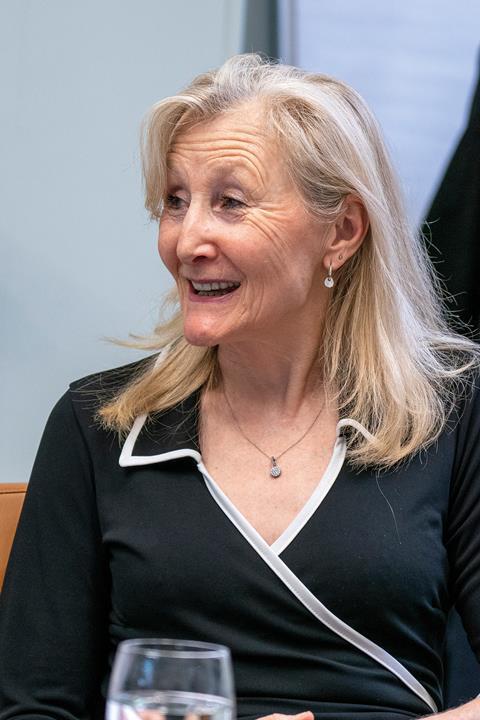
‘[Firms] are always asking ... fee-earners to do more and to achieve higher growth targets,’ he continues. But that is happening in a context where the source of funds and the corporate structures involved in transactions are less simple than in the past. ‘The whole piece has become more complex,’ he says. ‘I think that is the concern for all of us who [wear] the risk management hat.’
Lee Baxter, director of risk and compliance at Collyer Bristow, says his firm has focused on improving profitability from within its existing client base and instructions, which also has the effect of reducing the risks that can come with chasing new clients. ‘There’s actually quite a lot of work that people can do to improve profitability with the existing workload,’ he observes. This includes ‘reminding people about the importance of client care information’, in order to avoid, ‘profits being written off because clients haven’t been kept fully informed of the level of fees that were being incurred… a lot of money is lost through poor communication with clients’.
That may also mean billing at various stages in the matter, rather than all at once at the end. It is an arrangement that Harrison believes reduces the risk of lawyers making misjudgements. He gives the example of a transaction with ‘a quarter of a million pounds work in progress. If the transaction falls over, you aren’t going to get paid, [so] you become a stakeholder,’ he says, and may therefore be under pressure to be less diligent on some aspects of the deal. ‘The client’s got you on the hook… I’ve seen that so many times,’ Harrison relates.
And having money on account, he adds, means a lawyer can withdraw from a matter smoothly – subtracting fees and returning the balance and funds in the account.
Peter Taylor, senior partner at Paris Smith, continues: ‘One thing that we have been focusing on over the course of recent years is our relationship with data; being really clear about the data that we’ve got and the power of it in terms of how it helps to inform us in our decisions – and particularly knowing who we’re dealing with.’ Paris Smith has sought to embed a culture where it is ‘giving huge credence to the non-lawyer professionals, particularly those who are in compliance because they’re there to try and keep us safe’.
The digitisation of legal services, Taylor notes, has improved the status of non-fee-earners generally, as the systems needed to succeed are heavily reliant on such colleagues.
'We have clients complaining, “I’ve given this to the bank. I’ve given this to the estate agent. Now I’m giving it to you.” And they’re right. It’s just a duplication all the way through'
Marina Vincent, Harold Benjamin
Lawyers are not alone in needing to check client identities and the source of funds. This prompts Harold Benjamin partner Marina Vincent to observe: ‘There should be a completely new body instituted where ID, verification and source of funds information is dealt with and then banks can use it, we can use it, estate agents can use it.’ The current decentralisation of checks also slows deals down, because it leads to duplication. ‘We do a lot of property work,’ she says, ‘and we have clients complaining, “I’ve given this to the bank. I’ve given this to the estate agent. Now I’m giving it to you.” And they’re right. It’s just a duplication all the way through.’
DWF partner Sheona Wood sees merit in a different approach: ‘A single body is a good idea because that certainly seems to be the way things are going politically with the register of overseas entities, the reforms to Companies House and so on.’
Lawyers still need to develop and exercise their judgement, Harrison points out. The responsibility cannot be ‘outsourced’, and lawyers and support staff do need to ‘develop that instinct for a bad smell’. There is, various attendees note, a difference between relying on a third party for simple verification checks, and assessing the features of a transaction for unusual features that require close interrogation.
In general, Taylor observes: ‘As money laundering and regulatory issues have come to the fore, people are being far more wise about who they want to act for.’
SRA report card: assessing the regulator
The Solicitors Regulation Authority has completed ‘thematic reviews’ in the key areas of law firm culture and ‘SLAPPs’ (strategic law suits against public participation).
Media lawyer Iain Wilson, partner at Brett Wilson (pictured), is critical of the SRA’s conclusions on SLAPPs. ‘It’s alleged that lawyers are… somehow complicit in hiding wrongdoing,’ he says, noting that the regulator may have felt political pressure to act.
A selection of firms were asked by the regulator to produce a list of files that involved litigation on behalf of a corporate or a high-net-worth individual. ‘The headline point for me was that there was no evidence of lawyers being complicit in any SLAPPs at all and generally there were good levels of compliance,’ says Wilson, who recently produced a very well received article for the Gazette on the subject. ‘Where I see improper behaviour, questionable behaviour, it tends to be from firms that are dabbling’ rather than specialist media firms, Wilson says, adding: ‘We’ve all been lied to by clients.’
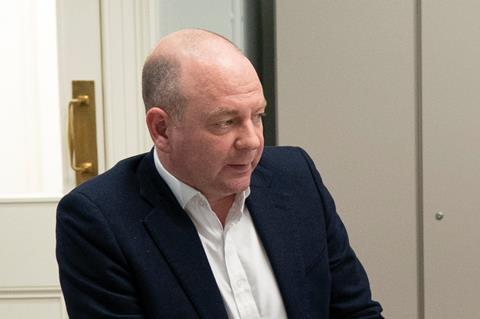
‘I think we have to be very careful here about access to justice,’ warns RPC partner Sam Tate. ‘That is fundamental to our profession and everybody ought to have access to a good lawyer.’
There is more consensus on the topic of ‘law firm culture’ and its link to ‘wellbeing’. ‘I think it’s really important to hear that people and firms are talking about wellbeing,’ Sharon Glynn, director, underwriting at Travelers Europe, says. Glynn says wellbeing might once have been mockingly characterised as ‘the fluffy things around the edges. That was one of the positives of Covid,’ she adds. ‘It brought conversations about wellbeing into law firms. Firms started recognising that, “If we invest in more people and their wellbeing, then it does pay dividends and actually there’s a business case for it. If you’ve got happy people, they generally do better at work”.’
To that end, there are strong views from those present on the way the SRA conducts investigations, with little attention paid to the pressure placed on junior solicitors in particular. Lengthy investigations and poor communication with those under investigation are singled out.
As Weightmans partner Susanna Heley says grimly: ‘If you haven’t got a mental health problem going into an SRA investigation, you may well have one coming out of an SRA investigation.’
Economic crime
Multiple demands are being placed on lawyers and their clients by sanctions and economic crime legislation – and there is more to come.
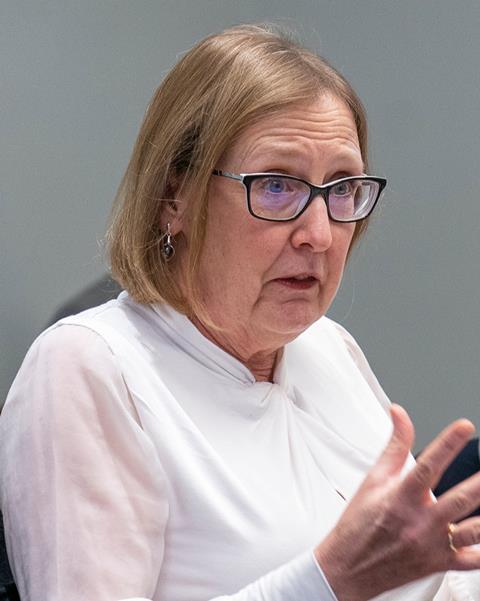
International firm Trowers & Hamlins has a singular experience of one such requirement, as the only law firm initially to be granted approval on the Companies House register to do verification work under the Economic Crime Act. The act covers the required public registration of beneficial ownership of overseas entities owning UK property.
The firm’s unique status led to client base referrals from many other law firms. ‘We made sure that we had a risk appetite schedule,’ the firm’s general counsel Claire Larbey relates. ‘We would only take on certain remits of work. We turned down plenty of approaches… We had a very low-risk appetite.’
Trowers established an Economic Crime Act unit, in part using very senior analysts from its ‘business intake unit’ (BIU). The BIU is a sophisticated operation, as described by Larbey: ‘On the anti-money laundering side of the Business Intake Unit, we’ve got a very detailed process with specific client/matter onboarding forms and risk assessments. Lots of information is gathered at the front end from clients, so it was a not a great step change for the analysts to undertake the Economic Crime Act verification work. The main difference in the Economic Crime Act work was that the Economic Crime Act team liaised directly with the clients, as opposed to the legal teams, so paralegals were recruited into the team, for this purpose, who were used to dealing direct with clients, sending out client care letters and terms and conditions of business and billing for the work.’
What about the work Trowers turned away because of the firm’s low appetite for risk? ‘A lot of work that we wouldn’t take on went to the accountants or other agencies which were specifically set up to undertake verification work.’
'London is one of the two financial centres of the world, along with New York, and it is therefore one of the centres for financial crime. And as a group, we’re not doing enough to meet that threat'
Sam Tate, RPC
Even closer to home for law firms are the likely demands contained in the Economic Crime and Corporate Transparency Bill, currently at committee stage in the House of Lords. The bill, which seeks to improve the reliability of data held at Companies House, will give new powers to the SRA, including the power to issue unlimited fines. Law enforcement would also be given new powers to obtain information to tackle money laundering and terrorist financing.
The impact of the legislation is ‘going to be huge’, RPC partner Sam Tate reckons. ‘As far as the government and others are concerned,’ Tate says, ‘[many] law firms… are engaged in enabling financial crime. London is one of the two financial centres of the world, along with New York, and it is therefore one of the centres for financial crime. And as a group, we’re not doing enough to meet that threat. They’re going to start wielding a much bigger stick that’s much easier to use’.
Criminal liability for partnerships is among the measures contained in the bill. ‘That I think is a sea-change,’ Tate says. ‘It reflects the seriousness of the executive in how it approaches our role, as in law firms’ role in financial crime in this city or in this country.’ He highlights in particular the new criminal offence of failing to prevent fraud.
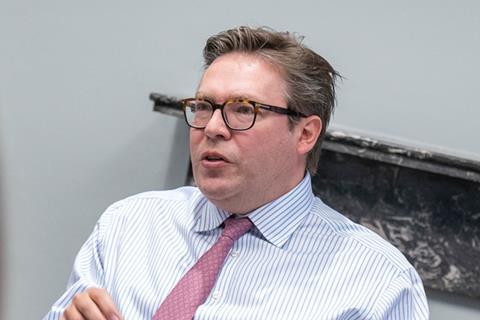
Prosecution bodies, Tate adds, may have insufficient resources, but that does not mean that a body like the Serious Fraud Office would not seek to make an example of some firms: ‘I think there’s an appetite, within the executive, to bring these cases because I’m afraid that law firms are in the crosshairs, and we are seen as being part of the problem.’
Heley has some reservations here. ‘I think it’s actually weaker than the existing powers that the SRA has,’ she says. ‘It’s going to cause them more problems than they anticipate, because the way that the bill is drafted, the powers are very specifically limited to rules solely designed for the prevention of economic crime.’ The easiest course of action, she argues, is for the SRA to send a case to the tribunal, which it can do ‘without having to prove any sort of crime at all’.
Tate responds: ‘If I was a regulator or a prosecutor, I would know that there will be law firms who are extremely well represented on the other side, and that will be very costly and difficult. But that is no different to the SFO [deciding to bring cases against] Airbus, Rolls-Royce, Standard Bank.
These are all very well-heeled defendants with very good legal teams. This didn’t stop the SFO going after them as corporates, successfully.’
In general, Brophy observes: ‘It’s really an interesting development because I think it fundamentally moves the SRA even further away from the profession and it makes them stand in isolation more and more. When they were talking about powers they wanted to take on – and they were very keen to take on enforcement and investigation – they also acknowledged that they had to do a lot of work internally to increase their own transparency in relation to how they were carrying out such investigations, and what measures … the profession could [use to] hold them to account.’
This roundtable discussion was kindly sponsored by Travelers
Photographs by Noah Da Costa























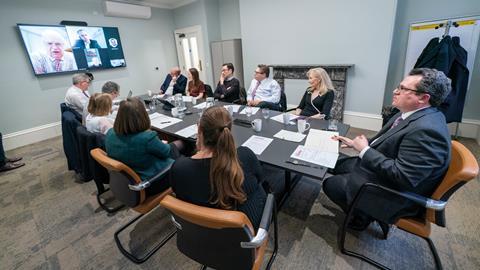













No comments yet